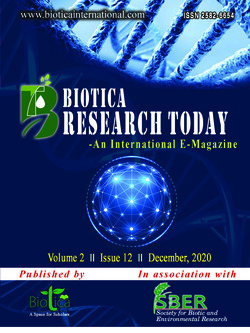
Floral Biology and Sex Expression in Papaya
C. Sankar*
Horticultural College and Research Institute, Periyakulam, Tamil Nadu (625 604), India
C. Senthilraja
Horticultural College and Research Institute, Periyakulam, Tamil Nadu (625 604), India
J. Rajangam
Horticultural College and Research Institute, Periyakulam, Tamil Nadu (625 604), India
Sneha R. Patil
College of Agricultural Technology, Gullapuram, Theni, Tamil Nadu (625 562), India
DOI: NIL
Keywords: Carica papaya L., Floral biology, Papaya, Sex expression
Abstract
The papaya, Carica papaya L., is native totropical America and commercially cultivated throughout the tropical and sub-tropical regions of India. Propagation of papaya by seed is still the most commercial cultivation method. Generally, the number of male plants outnumbers the females in a plantation, which renders it unproductive. Growers are unaware of identifying the productive and unproductive plants at the nursery stage, So as to have male and female plants. The papaya is generally taken flowers within 75 to 150 days after transplanting. The gynodioecious varieties are preferred for commercial purpose, due to their high yield potential and occurrence of desirable types of sex expression among the flower types. So it is knowledge on selecting desirable papaya cultivars at the seedling stage that would help in raising the papaya orchard with the appropriate design.
Downloads
not found
Reference
Storey, W.B., 1941. The botany and sex relations of the papaya. Hawaii Agriculture Experiment Station Bulletin 87, 5-22.
Storey, W.B., 1958. Modification of sex expression in papaya. Horticulture Advance 2, 49-60.
Victor M. Jimenez, Eric Mora-Newcomer, Marco V. Gutierrez-Soto, 2014. In: genetics and genomics of papaya, biology of the papaya plant, Springer.
